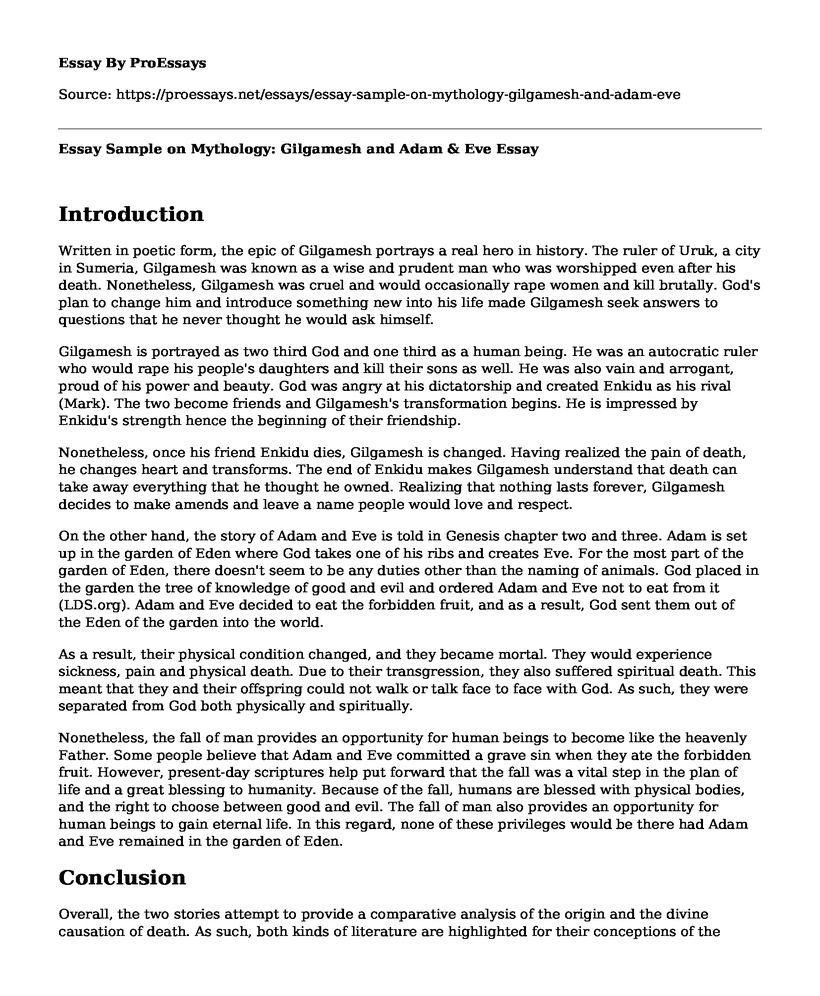Introduction
Written in poetic form, the epic of Gilgamesh portrays a real hero in history. The ruler of Uruk, a city in Sumeria, Gilgamesh was known as a wise and prudent man who was worshipped even after his death. Nonetheless, Gilgamesh was cruel and would occasionally rape women and kill brutally. God's plan to change him and introduce something new into his life made Gilgamesh seek answers to questions that he never thought he would ask himself.
Gilgamesh is portrayed as two third God and one third as a human being. He was an autocratic ruler who would rape his people's daughters and kill their sons as well. He was also vain and arrogant, proud of his power and beauty. God was angry at his dictatorship and created Enkidu as his rival (Mark). The two become friends and Gilgamesh's transformation begins. He is impressed by Enkidu's strength hence the beginning of their friendship.
Nonetheless, once his friend Enkidu dies, Gilgamesh is changed. Having realized the pain of death, he changes heart and transforms. The end of Enkidu makes Gilgamesh understand that death can take away everything that he thought he owned. Realizing that nothing lasts forever, Gilgamesh decides to make amends and leave a name people would love and respect.
On the other hand, the story of Adam and Eve is told in Genesis chapter two and three. Adam is set up in the garden of Eden where God takes one of his ribs and creates Eve. For the most part of the garden of Eden, there doesn't seem to be any duties other than the naming of animals. God placed in the garden the tree of knowledge of good and evil and ordered Adam and Eve not to eat from it (LDS.org). Adam and Eve decided to eat the forbidden fruit, and as a result, God sent them out of the Eden of the garden into the world.
As a result, their physical condition changed, and they became mortal. They would experience sickness, pain and physical death. Due to their transgression, they also suffered spiritual death. This meant that they and their offspring could not walk or talk face to face with God. As such, they were separated from God both physically and spiritually.
Nonetheless, the fall of man provides an opportunity for human beings to become like the heavenly Father. Some people believe that Adam and Eve committed a grave sin when they ate the forbidden fruit. However, present-day scriptures help put forward that the fall was a vital step in the plan of life and a great blessing to humanity. Because of the fall, humans are blessed with physical bodies, and the right to choose between good and evil. The fall of man also provides an opportunity for human beings to gain eternal life. In this regard, none of these privileges would be there had Adam and Eve remained in the garden of Eden.
Conclusion
Overall, the two stories attempt to provide a comparative analysis of the origin and the divine causation of death. As such, both kinds of literature are highlighted for their conceptions of the origin and connection with the death. Both stories detail the life and times of Gilgamesh, Adam and Eve and their life after transformation. They recount how the characters departed from the good and how they ended up doing what was evil. Both accounts, therefore, highlight the changes and consequences that took place following their actions.
Works Cited
LDS.org. The Fall of Adam and Eve "Chapter 6: The Fall of Adam and Eve," Gospel Principles (2011), 26-30. n.d. https://www.lds.org/manual/gospel-principles/chapter-6-the-fall-of-adam-and-eve?lang=eng.
Mark, Joshua. Gilgamesh. 29 March 2018. https://www.ancient.eu/gilgamesh/.
Cite this page
Essay Sample on Mythology: Gilgamesh and Adam & Eve. (2022, Dec 12). Retrieved from https://proessays.net/essays/essay-sample-on-mythology-gilgamesh-and-adam-eve
If you are the original author of this essay and no longer wish to have it published on the ProEssays website, please click below to request its removal:
- Essay Example on A Rose for Emily: A Murder or a Suicide?
- Deconstruction and Postmodernism Approach to Case Study: A Doll's House
- Ballad of the Totems by Oodgeroo Noonuccal (Kath Walker)
- Form, Sexuality, and Supernatural in Sir Gawain and the Green Night and John Donne's The Flea
- Critical Essay on Jane Eyre: A Tale of Injustice & the Women's Movement
- Essay on Beloved: A Story of Black Struggles and Triumph in Pre-Civil War America
- Essay on Joe Jamaldinian: IT Consultant, Children's Book Author, Resident of Burke







